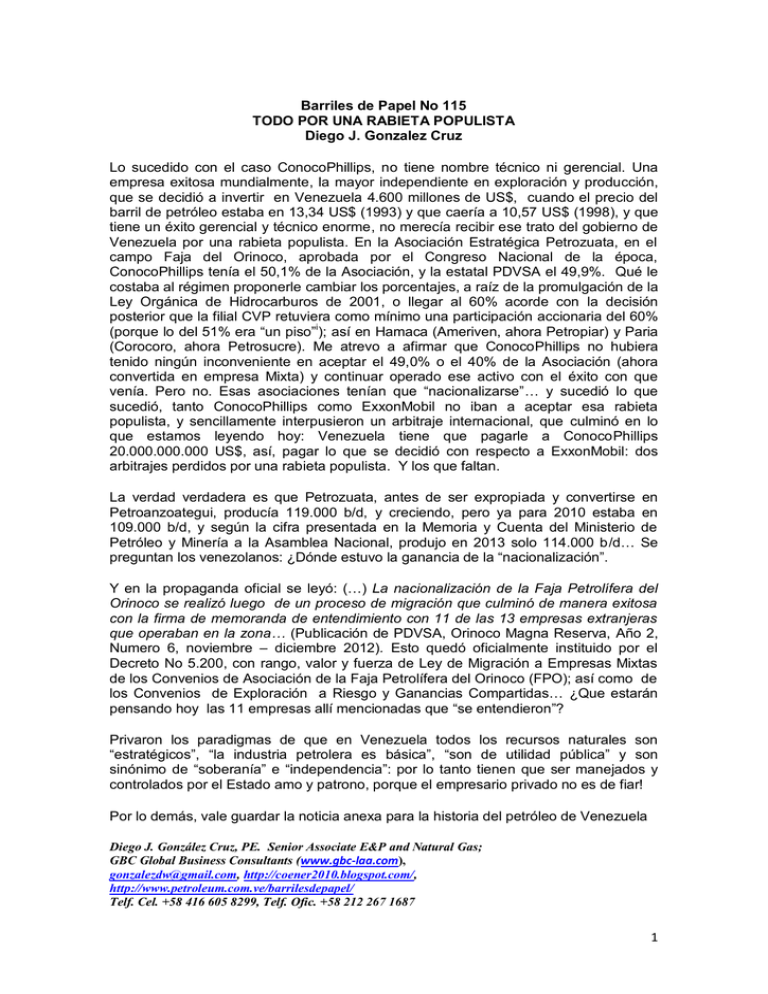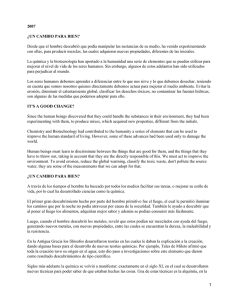Descargar Barriles de Papel No. 115
Anuncio

Barriles de Papel No 115 TODO POR UNA RABIETA POPULISTA Diego J. Gonzalez Cruz Lo sucedido con el caso ConocoPhillips, no tiene nombre técnico ni gerencial. Una empresa exitosa mundialmente, la mayor independiente en exploración y producción, que se decidió a invertir en Venezuela 4.600 millones de US$, cuando el precio del barril de petróleo estaba en 13,34 US$ (1993) y que caería a 10,57 US$ (1998), y que tiene un éxito gerencial y técnico enorme, no merecía recibir ese trato del gobierno de Venezuela por una rabieta populista. En la Asociación Estratégica Petrozuata, en el campo Faja del Orinoco, aprobada por el Congreso Nacional de la época, ConocoPhillips tenía el 50,1% de la Asociación, y la estatal PDVSA el 49,9%. Qué le costaba al régimen proponerle cambiar los porcentajes, a raíz de la promulgación de la Ley Orgánica de Hidrocarburos de 2001, o llegar al 60% acorde con la decisión posterior que la filial CVP retuviera como mínimo una participación accionaria del 60% (porque lo del 51% era “un piso”i); así en Hamaca (Ameriven, ahora Petropiar) y Paria (Corocoro, ahora Petrosucre). Me atrevo a afirmar que ConocoPhillips no hubiera tenido ningún inconveniente en aceptar el 49,0% o el 40% de la Asociación (ahora convertida en empresa Mixta) y continuar operado ese activo con el éxito con que venía. Pero no. Esas asociaciones tenían que “nacionalizarse”… y sucedió lo que sucedió, tanto ConocoPhillips como ExxonMobil no iban a aceptar esa rabieta populista, y sencillamente interpusieron un arbitraje internacional, que culminó en lo que estamos leyendo hoy: Venezuela tiene que pagarle a ConocoPhillips 20.000.000.000 US$, así, pagar lo que se decidió con respecto a ExxonMobil: dos arbitrajes perdidos por una rabieta populista. Y los que faltan. La verdad verdadera es que Petrozuata, antes de ser expropiada y convertirse Petroanzoategui, producía 119.000 b/d, y creciendo, pero ya para 2010 estaba 109.000 b/d, y según la cifra presentada en la Memoria y Cuenta del Ministerio Petróleo y Minería a la Asamblea Nacional, produjo en 2013 solo 114.000 b/d… preguntan los venezolanos: ¿Dónde estuvo la ganancia de la “nacionalización”. en en de Se Y en la propaganda oficial se leyó: (…) La nacionalización de la Faja Petrolífera del Orinoco se realizó luego de un proceso de migración que culminó de manera exitosa con la firma de memoranda de entendimiento con 11 de las 13 empresas extranjeras que operaban en la zona… (Publicación de PDVSA, Orinoco Magna Reserva, Año 2, Numero 6, noviembre – diciembre 2012). Esto quedó oficialmente instituido por el Decreto No 5.200, con rango, valor y fuerza de Ley de Migración a Empresas Mixtas de los Convenios de Asociación de la Faja Petrolífera del Orinoco (FPO); así como de los Convenios de Exploración a Riesgo y Ganancias Compartidas… ¿Que estarán pensando hoy las 11 empresas allí mencionadas que “se entendieron”? Privaron los paradigmas de que en Venezuela todos los recursos naturales son “estratégicos”, “la industria petrolera es básica”, “son de utilidad pública” y son sinónimo de “soberanía” e “independencia”: por lo tanto tienen que ser manejados y controlados por el Estado amo y patrono, porque el empresario privado no es de fiar! Por lo demás, vale guardar la noticia anexa para la historia del petróleo de Venezuela Diego J. González Cruz, PE. Senior Associate E&P and Natural Gas; GBC Global Business Consultants (www.gbc-laa.com), [email protected], http://coener2010.blogspot.com/, http://www.petroleum.com.ve/barrilesdepapel/ Telf. Cel. +58 416 605 8299, Telf. Ofic. +58 212 267 1687 1 ANEXO Venezuela Loses Challenge to Judges in $30 Billion ConocoPhillips Expropriation http://www.laht.com/article.asp?ArticleId=2156927&CategoryId=10717 WASHINGTON, D.C. – The World Bank’s arbitration forum, the International Center for the Settlement of Investment Disputes (ICSID), has ruled against Venezuela’s request to disqualify two judges who ruled against it in a multi-billion dollar suit brought by oil giant ConocoPhillips against the oil rich Latin nation over the expropriation of ConocoPhillips' investments there. In March, two of the three arbitrators on the panel rejected Venezuela’s request for a new hearing, after the panel had found in September that Venezuela had expropriated ConocoPhillips’ investments and failed to engage in “good faith” negotiations to compensate the company. Having found jurisdiction, injury and responsibility for the breach, the ICSID panel had then called on the lawyers for both sides to move on to debating the amount of the damages that Venezuela should have to pay. Venezuela sought to have the case re-heard or re-opened and when the majority of arbitrators decided against them, they sought to have the arbitrators removed. “In the Chairman’s view, a third party undertaking a reasonable evaluation of the facts in this case, would not conclude that they indicate a manifest lack of the qualities required under … the ICSID Convention. Accordingly, the disqualification proposal must be rejected,” wrote Dr. Jim Yong Kim, Chairman of the ICSID Administrative Council, in the decision released Tuesday. “Having considered all of the facts alleged and the arguments submitted by the parties, and for the reasons stated above, the Chairman rejects the Bolivarian Republic of Venezuela’s Proposal to Disqualify Judge Kenneth Keith and Mr. L. Yves Fortier.” Long-time Venezuela legal counsel George Kahale III, chairman of international law firm Curtis, Mallet-Prevost, Colt & Mosle, had argued that the arbitrators' "steadfast refusal to entertain an application for reconsideration of the [Decision on Jurisdiction and Merits] on an important issue that they decided based on what has been proven beyond doubt to be false premises and their negative ‘general attitude vis-à-vis the Respondent,’ their propensity to decide by ‘sheer fiat,’ their adoption of ‘a presumption . . . of a constant pattern of conduct attributable to the Respondent, of not hesitating to violate its obligations whenever it suited its purposes,’ and their ‘relying almost exclusively and uncritically on the affirmations and representations of the Claimants throughout the proceedings [which] have evinced a lack of the requisite impartiality...." ConocoPhillips argued that Venezuela’s case was “patently frivolous and that it is part of a series of meritless and desperate delaying tactics by Venezuela” and was “founded on nothing more than the Respondent’s unhappiness with the Procedural Decision.” ConocoPhillips originally brought the biggest case to date against Venezuela in December of 2007 seeking $30 billion in compensation for its stakes in two Orinoco projects - Petrozuata and Hamaca - and two joint venture exploration agreements in the Gulf of Paria, all of which Venezuela expropriated in 2007.After years of briefs and hearings -- including an earlier attempt by Venezuela to disqualify one of the 3 arbitrating judges and the death and replacement of another -- on September 3, 2013, ICSID ruled that it had jurisdiction to hear the claim and that Venezuela had indeed breached its obligations under the Netherland's Bilateral Investment Treaty "to negotiate in good faith" to compensate ConocoPhillips for the expropriation and was therefore liable to pay damages for the expropriation. In an unusual move that the majority of the panel ruled was not allowed, Venezuela sought to have the panel "re-consider" the 2 jurisdiction and liability decision, after writing a letter 5 days after the decision, on September 8, 2013 (below), and claiming that new evidence had come to light via a U.S. Embassy cable leaked by Wikileaks that Venezuela had not stopped negotiating. The supposed cable, which was published by Wikileaks back in September 2008, was not really new, however. After examining the ICSID treaty and past rulings, the majority of the Tribunal concluded “that it does not have the power to reconsider the Decision of 3 September 2013," the majority made up of Judge Kenneth Keith, President, and L. Yves Fortier, CC, QC, wrote. "Section 3 of Part IV of the ICSID Convention sets out the Powers and Functions of the Tribunal, with nothing among its provisions even hinting at such a power."The judge appointed by Venezuela, Egyptian Professor Georges Abi-Saab, dissented and was not challenged by Venezuela in this case. Abi-Saab, had replaced the original judge appointed by Venezuela, English barrister Sir Ian Brownlie, after Brownlie died in 2009.ConocoPhillips, which says it invested over $4.6 billion in the oil ventures starting in the 1990s, is reportedly seeking atleast $6.5 billion for the seized assets. Venezuela has offered $2.3 billion. Another U.S. oil giant, Exxon Mobil Corp, has been seeking up to $10 billion at ICSID also for the expropriation in 2007 of a large heavy crude project in the Orinoco region. In February of 2012, Venezuela was ordered to pay ExxonMobil about $908 million in compensation by the International Chamber of Commerce (ICC) in lost contractual earnings because of the expropriations. "The ICSID decision on the actual losses suffered by ExxonMobil from Venezuela's expropriation is expected soon," said Russ Dallen, an international lawyer and banker who follows the cases and studied under ICSID judge Sir Ian Brownlie at Oxford University. "Venezuela and ExxonMobil filed their final post-hearing briefs almost 2 years ago in May of 2012." When the Latin American Herald Tribune reported the ICSID decision siding with ConocoPhillips in March, Dallen had predicted that Venezuela – which has been hit by a widespread food and consumer staple shortages because of a lack of hard currency dollars -would keep stalling for time by trying to disqualify the arbitrators, noting that Venezuela had already tried disqualifying Judge Fortier previously. In October of 2011, Venezuela had unsuccessfully challenged Canadian Judge L. Yves Fortier, QC, who had been appointed by ConocoPhillips (decision below). According to the ICSID docket, Venezuela now has 27 cases pending against it – the most of any nation in the world -- after a rash of expropriations and nationalizations by Venezuela's late firebrand President Hugo Chavez. Argentina, which had previously held the number one spot after defaulting on $100 billion in international bond debt, now has only 24 cases listed as pending. Venezuela had been a member of ICSID since 1993, but Chavez formally removed the country from ICSID jurisdiction in January of 2012, saying he would not accept any further rulings from the arbitration court. However, clauses in bilateral investment treaties and individual contracts continue to give ICSID jurisdiction to hear cases against Venezuela. Other companies with pending ICSID arbitrations against Venezuela include mining and smelting companies AngloAmerican, Gold Reserve Inc., Rusoro Mining Ltd., Crystallex International Corporation, and Tenaris SA; food industry companies Gruma, Polar, Longreef, Vestey, and Owens-Illinois Inc.; and oil industry companies Tidewater Inc., Williams Cos. Inc., Koch Industries Inc., ConocoPhillips, and ExxonMobil.ICSID is an autonomous international institution established in 1965 under the Convention on the Settlement of Investment Disputes between States and Nationals of Other States (the ICSID or the Washington Convention) with over one hundred and forty member States. The Convention sets forth ICSID's mandate, organization and core functions. The primary purpose of ICSID is to provide facilities for conciliation and arbitration of international investment disputes. i http://www.pdvsa.com/interface.sp/database/fichero/publicacion/1412/60.PDF 3
